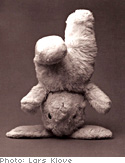Play's the Thing

Play is one of those things we tend to take for granted until we miss it. It is much like breathing or dreaming in the way it fits seamlessly, invisibly, into a healthy life. It is a natural capacity of the human mind. As with breathing, we do it effortlessly. And as with dreaming, while we can be totally immersed in play, we often forget about it when we are done. To try to find the point of play is to miss the point of it. Play, after all, has no point; it is purposeless.
Why do we bother then if it has no purpose? Why spend our time in purposeless activity? Why not leave play to children and be done with it? Our need for play is mysterious, again akin to our need for dreaming. We have played almost from the beginning, since we made (or were asked to accept) the first tentative separations from our parents. Play filled the space, and it continues to, even as it takes on the form of creative or cultural activity.
Like breathing and dreaming, play serves a homeostatic function. Like a thermostat, it kicks in when the internal environment is too hot or too cold and brings things into a more tolerable balance. Just as the breath regulates oxygen levels in the blood, and the dream affects the brain's neurotransmitters in sleep, play brings balance to our emotional lives. Through the medium of symbolic communications, sometimes secret and sometimes shared, play helps us make sense of our worlds. It is how we process what happens to us, and how we communicate what we are processing. It is how we breathe air into our emotions and how we find out what we are feeling. As any good psychotherapist knows, play and emotional health are synonymous. In fact psychotherapy is a kind of play, and play a particular kind of therapy.
Why do we bother then if it has no purpose? Why spend our time in purposeless activity? Why not leave play to children and be done with it? Our need for play is mysterious, again akin to our need for dreaming. We have played almost from the beginning, since we made (or were asked to accept) the first tentative separations from our parents. Play filled the space, and it continues to, even as it takes on the form of creative or cultural activity.
Like breathing and dreaming, play serves a homeostatic function. Like a thermostat, it kicks in when the internal environment is too hot or too cold and brings things into a more tolerable balance. Just as the breath regulates oxygen levels in the blood, and the dream affects the brain's neurotransmitters in sleep, play brings balance to our emotional lives. Through the medium of symbolic communications, sometimes secret and sometimes shared, play helps us make sense of our worlds. It is how we process what happens to us, and how we communicate what we are processing. It is how we breathe air into our emotions and how we find out what we are feeling. As any good psychotherapist knows, play and emotional health are synonymous. In fact psychotherapy is a kind of play, and play a particular kind of therapy.



